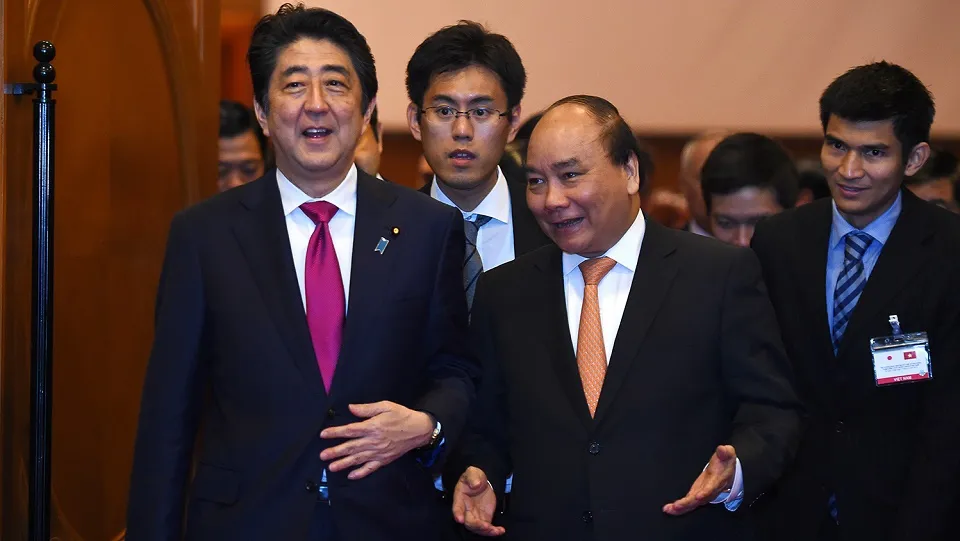Abe Shinzo: Long-time friend of Vietnam
Vietnamese media reminisced fondly about affable moments Abe Shinzo had in Vietnam and his contributions to bilateral relations.
Former Japanese Prime Minister Abe Shinzo, who passed away today [July 8], had a special affection for Vietnam during his terms, contributing to strengthening the strategic partnership between Vietnam and Japan.
The sudden passing of Abe Shinzo, 67, has left great regret in the hearts of the Japanese people as well as people around the world.
For the Vietnamese, Abe is remembered as the Japanese leader who so far visited Vietnam the most, four times during his stints. Abe served two separate terms as Japanese leader for the right-leaning Liberal Democratic Party (LDP).
At this dark and sad time, Vietnamese media reminisced fondly about affable moments he had in Vietnam and his contributions to bilateral relations.
| Japanese Prime Minister Shinzo Abe (L) and Vietnamese PM Nguyen Xuan Phuc during his visit to Hanoi in 2017. Photo: VNA |
Four visits to Vietnam
Abe visited Vietnam four times in November 2006, January 2013, January 2017, and November 2017.
In an interview with the Vietnam News Agency in February 2019, Abe talked about the Japanese people’s admiration for the industrious and warm-hearted Vietnamese, who have an affinity for his country’s language and culture.
He said: “I would love to deepen the relationship between the two countries.”
In November 2006, Abe visited Vietnam just two months after he took the office. He was the one stressing Vietnam’s strategic role in Japan’s foreign affairs. Soon after he took on the position, the two countries released a joint statement on elevating the bilateral relations to strategic partnership.
In January 2013, Vietnam was the destination of Abe’s first overseas trip after being re-elected. In March 2014, the relations were upgraded to “extensive strategic partnership for peace and prosperity in Asia.”
In 2017, Abe paid two visits to Vietnam, in January and November.
During his terms, Japan’s Emperor Akihito and his spouse Michiko Shōda paid a historic visit to Vietnam between February 28 and March 5, 2017.
Japan was also the first Group of Seven (G7) country (together with Canada, France, Germany, Italy, the UK, and the US) to invite Vietnam to attend the G7 Extension Summit in May 2016.
Substantive actions
Indeed, Vietnam–Japan ties have reached new heights thanks to Abe’s diplomatic dynamism according to Xuan Dung Phan, a graduate research student at S Rajaratnam School of International Studies (RSIS), Nanyang Technological University, Singapore.
Acknowledging Vietnam’s importance in Japan’s Asia Pacific foreign policy, Abe made special efforts to institutionalize bilateral cooperation.
Vietnam–Japan strategic cooperation was further fostered under Abe’s flagship Free and Open Indo-Pacific (FOIP) strategy which has three dimensions: promoting rule of law and freedom of navigation, contributing to peace and security through capacity-building, and advancing economic prosperity and connectivity through infrastructure.
Throughout Abe’s tenure, Japan zealously backed Hanoi’s proactive diplomacy in pressing regional and international matters. To Abe, Japan and Vietnam are ‘connected by free ocean’ and the two should collaborate in supporting the regional rules-based order.
Tokyo has also demonstrated its willingness to assist Hanoi in maritime law enforcement capacity-building. Japan offered Vietnam six coast-guard vessels to boost the Southeast Asian country’s ability to defend its waters. In 2016, Abe pledged six brand new patrol ships for the Vietnam Coast Guard and Japan recently inked a US$345 million loan agreement to realize the promise.
Abe was highly committed to providing official development assistance (ODA) for Vietnam. From 2014 to 2018, Japan granted approximately US$280 million in ODA to assist infrastructure development, human resource management, and environmental and governance practices in Vietnam. Japan is currently Vietnam’s biggest ODA donor.
Japanese direct investment is also on the rise, with Vietnam being a priority destination under Japan’s Partnership for Quality Infrastructure Initiative.
As advocates of enhanced regional economic connectivity, Hanoi and Tokyo worked closely together on the Comprehensive and Progressive Agreement for Trans-Pacific Partnership (CPTPP) at the 2017 APEC Summit. Abe’s leadership was pivotal in reviving the deal following the US withdrawal.
The people-to-people exchange has also been promoted with great enthusiasm. During his third trip to Vietnam, Abe visited Vietnam-Japan University, where he remarked that the institution is a bridge linking the two countries. Launching its first academic year in 2016, the university aims to provide Vietnamese students with internship and job opportunities in Japanese firms.
Abe Shinzo was Japan’s longest-serving prime minister (2,799 days). His legacy was profound, especially Abenomics which helped lift the economy out of chronic deflation and beef up the military.
Following his death, the world’s leaders have extended their condolences for the passing of the former Japanese PM who was a friend of many of them.
Vietnamese Prime Minister Pham Minh Chinh and Foreign Minister Bui Thanh Son expressed their sympathies for the death of Vietnam’s friend. On his condolence message sent to Kishida Fumio on July 8, Chinh, on behalf of the Vietnamese leadership and people, sent deepest condolences to the Government, people of Japan and the family of former Prime Minister Abe Shinzo, expressing appreciation for the special affection and valuable support that Abe gave to the Southeast Asian country and people as well as the extensive strategic partnership between Vietnam and Japan. On the same day, Bui Thanh Son sent his condolence message to Japan’s Foreign Minister Yoshimasa Hayashi for Japan’s loss. |










